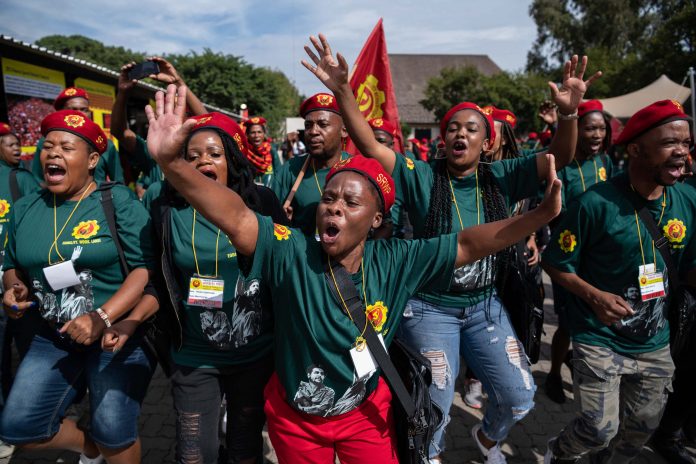
Over a thousand workers gathered from all the provinces in South Africa to launch the Socialist Revolutionary Workers Party (SRWP) at its inaugural congress on 4-6 April at Johannesburg, with international guests from countries like Argentina, Brazil, Morocco, Nepal Sweden and Zambia.
The party which was formed last year is a milestone in the struggle of workers for self-emancipation in the country, Africa and globally. SWL supports SRWP as an inspiration for the Nigerian trade union movement to draw from, and build a revolutionary socialist workers’ party.
The journey to forming SRWP started with the massacre of 34 mineworkers on 16 August 2012 by the Africa National Congress (ANC) government. The most advanced strata of the working-class called for a break with the capitalist ANC. The country’s largest union, the National Union of Metal Workers of South Africa, which has over 344,000 members was eventually expelled from the Congress of South African Trade Unions (COSATU), for demanding rupture of the trade union movement’s ties with the ANC.
South Africa has a long history of militant workers’ struggle. This was the driving force of anti-apartheid struggle for decades. After the defeat of the minority racist regime in 1994, this vibrant class-conscious workers’ movement was held back by a trade union bureaucracy which supported the ANC.
Despite continued use of revolutionary rhetoric, the Congress of South African Trade Unions (COSATU), and the South African Communist Party (SACP) lined up behind one faction or the other of the ANC, even when the ANC transformed from a national liberation movement to a party of the bosses.
In 1996, just two years into ANC’s “national democratic” rule, the radical-reformist Reconstruction and Development Programme (RDP) was abandoned for a neoliberal Growth, Employment and Redistribution (GEAR) programme. The consequences were far reaching.
On one hand, a handful of persons became stupendously rich. Black millionaires and billionaires emerged. These were well connected members of ANC like Cyril Ramaphosa (a former General Secretary of the National Union of Mineworkers who is now South African president) who had ties with the mining and energy corporations.
On the other hand, poverty and disillusionment set in for the vast majority of the population. Unemployment rose astronomically. The rich could access quality healthcare while the public hospitals suffered severe underfunding. Social inequality in South Africa became the highest in the world. But working-class people resisted with mass strikes and protests on the streets. South Africa also became the protest capital of the world.
It was within this context that about 3,000 mineworkers at the Lonmin platinum mines embarked on an indefinite strike to demand wage increase on 9 August 2012. Rather than give in to their demands, one week later 34 of them were brought down in a hail of bullets by the police. Marked in blood, this was a turning point in radical and revolutionary politics.
Subsequent to this, in a series of conferences starting from 2013 NUMSA set itself the interconnected radical targets of: organising along value chain; establishing a united front of anti-capitalist forces and; building a workers’ party. Similarly, becoming the backbone of a new revolutionary trade union centre – the South African Federation of Trade Unions (SAFTU) – was foisted on it when COSATU forced it and other radical unions out of that federation.
The “NUMSA moment” has now reached a crescendo, with the establishment of SRWP. This is not a party limited to electoral politics. The SRWP is a Marxist-Leninist Party fighting for the establishment of a classless society. It thus puts the struggle for socialism squarely on the agenda.
While it will contest in the 8 May general elections, as Allen Goatley of Keep Left notes: “the real test for the party will be after the elections. It will have to show its relevance in the day to day struggles of workers and the poor.”
by E. ‘Todun JAGUN








